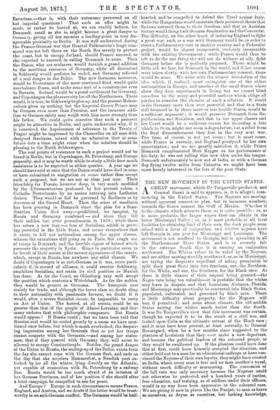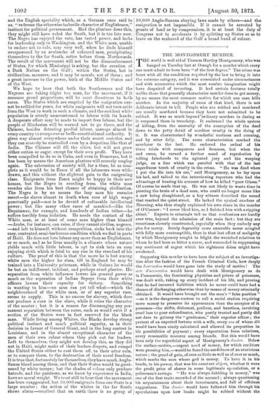THE NEW MOVEMENT IN THE UNITED STATES.
AGREAT movement, which De Tocqueville predicted, and General Grant is said to approve, is, it is alleged, com- mencing in the United States. The Negroes are moving, without apparent concert or plan, but in immense numbers, towards the States nearest the Gulf of Mexico. Whether it is the climate which attracts them, as is quite possible ; or, as is more probable, the larger wages they can obtain in the lower Mississippi Valley ; or, as is most probable of all, local facilities for obtaining land of their own, the dark people seem seized with a fever of emigration, and 30,000 negroes have left Georgia in one year for Mississippi and Louisiana. The movement is not confined to Georgia, but is spreading in all the Northernmost Slave States, and is so severely felt in the extreme South that it is causing an emigration northward. The Whites refuse to be ruled by the Negroes, and are either moving steadily northward, or, as in Mississippi, are trying the desperate expedient of asking permission to split their great State into two fractions, one, the Northern, for the White, and one, the Southern, for the Black race. As there is little chance of their request being granted—the Negro vote being too valuable—it is probable that the whites may leave in despair, and that Louisiana, Alabama, Florida, and Mississippi may practically be converted into Black States, populated, cultivated, and governed by black men. There is little difficulty about property, for the Negroes will buy, if permitted ; and none about climate, the old middle States suiting the whites much better than the South. It was De Tocqueville's view that this movement was certain, though he expected it to be the result of a civil war, and looked upon Cuba as the ultimate retreat of the Black race ; and it must have been present, at least mentally, to General Beauregard, when he a few months since suggested to the planters of Louisiana that they rnust make a new departure, and become the political leaders of the coloured people, or they would be swallowed up. If the planters could have done this at first, could have honestly accepted the situation, and either held out to a man for an educational suffrage or have cons vinced the Negroes of their own loyalty, they might have created an India, where every man is free and no man another's equal, without much difficulty or murmuring. The concession of the full vote was only necessary because the Negroes could not otherwise be protected, and a hundred years of justice, free education, and training, as of soldiers under their officers, would in no way have been oppressive to the coloured race. We are giving it now in places like the Punjab, to men as brave as ourselves, as Aryan as ourselves, but lacking knowledge,
and the English speciality which, as a German once said to us, "redeems the otherwise imbecile character of Englishmen," instinct for political government. Had the planters done this, they might still have ruled the South, but it is too late now. The Negro has enjoyed the vote, has tasted power, and looks for leadership only to Washington, and the White man, unable to endure not to rule, may very well, when he finds himself overpowered by an avalanche of coloured men, precipitating themselves to the far South, retire before them Northwards. The result of the movement will not be the dismemberment of States, for which Mississippi is asking, but the creation of a Dark Nation on the Gulf ; within the States, but in civilisation, manners, and it may be morals, not of them ; and a great increase to the power, both of the 'Middle States and of the West.
We hope to hear that both the Southerners and the Negroes are taking fright too soon, for the movement, if it assumes grand proportions, will be most disastrous to both races. The States which are emptied by the emigration can- not be refilled for years, for white emigrants will not turn aside from the West to work in such a climate, and the resident white population is utterly unaccustomed to labour with its hands. A desperate effort may be made to import free labour, but the people of Hindostan will be warned not to go there, and the Chinese, besides detesting predial labour, manage almost in every country to overpower or baffle constitutional authority. It gives way almost everywhere under their secret societies, and they can scarcely be controlled even by a despotism like that of India. The Chinese will fill the cities, but will not grow either cotton or sugar, except for their own profit. They have been compelled to do so in Cuba, and even in Demerara, but it has been by means the American planters will scarcely employ again. The subversion of society will, for a time, be as com- plete as it would be in Essex if all the labourers were with- drawn, and this without the slightest gain to the emigrating class. Emigrants from Essex might be happy in their new homes, but the Negro in receding from the white man recedes also from his best chance of obtaining civilisation. The Negro is by no means the lazy man his enemies assert—he slaves almost to death when sure of high wages punctually paid—nor is he devoid of culturable intellectual power ; but like many other races of mankind—like the Esquimaux, for example, and hundreds of Indian tribes—he suffers terribly from isolation. He needs the contact of the White man, or at least of some man higher than himself —Arabs, for instance, can raise, if they cannot civilise, negroes, —and left to himself, without competition, sinks back into the easy, contented, semi-barbarous condition which we find in parts of Haiti. He does not love labour any more than an Englishman, or so much, and as he lives usually in a climate where nature yields much with little labour, is apt to sink into an easy enjoying sloth which is fatal to any rise in the standard of his culture. The proof of this is that the more he is lost among white men the higher he rises, till in England he may be trained into a University prizeman, while in Guiana he would be but an indifferent, indolent, and perhaps cruel planter. His separation from white influence lowers his general power as much as the separation of Indian Sepoys from their white officers lowers their capacity for victory. Something is wanting to him—no man can yet tell what—which the neighbourhood of the white man, or of any superior race, seems to supply. This is no excuse for slavery, which does not produce a cure in the slave, while it ruins the character of the master ; but it is a reason for discouraging any per- manent separation between the races, such as would exist if a section of the States were in fact reserved for the black man. While living among Whites, the Blacks develop strong political instinct and much political sagacity, as in their decision in favour of General Grant, and in the long contest in Louisiana, and in the almost exceptional character of the men of their own colour whom they pick out for leaders. Left to themselves, they might not develop this, as they did not in Haiti, might make of their leaders despots, and compel the United States either to east them off, to their utter ruin, or to conquer them, to the destruction of their novel freedom. It is true that, fortunately for themselves, they have much Anglo- Saxon blood among them, and that their States would be garri- soned by white troops ; but the shades of colour only produce hatreds, and the garrisons, as we know by experience in India, have no moral weight. We trust still to hear that the movement has been exaggerated, but 30,000 emigrants from one State is a large number ; the action of the whites in the far South shows alarm—recollect that on earth there is no group of 10,000 Anglo-Saxons obeying laws made by others—and the emigration is not impossible. If it cannot be arrested by grants of land or by compromises, it is at least the duty of Congress not to accelerate it by splitting up States so as to leave on the seaboard of the Gulf a broad band of colour.































 Previous page
Previous page